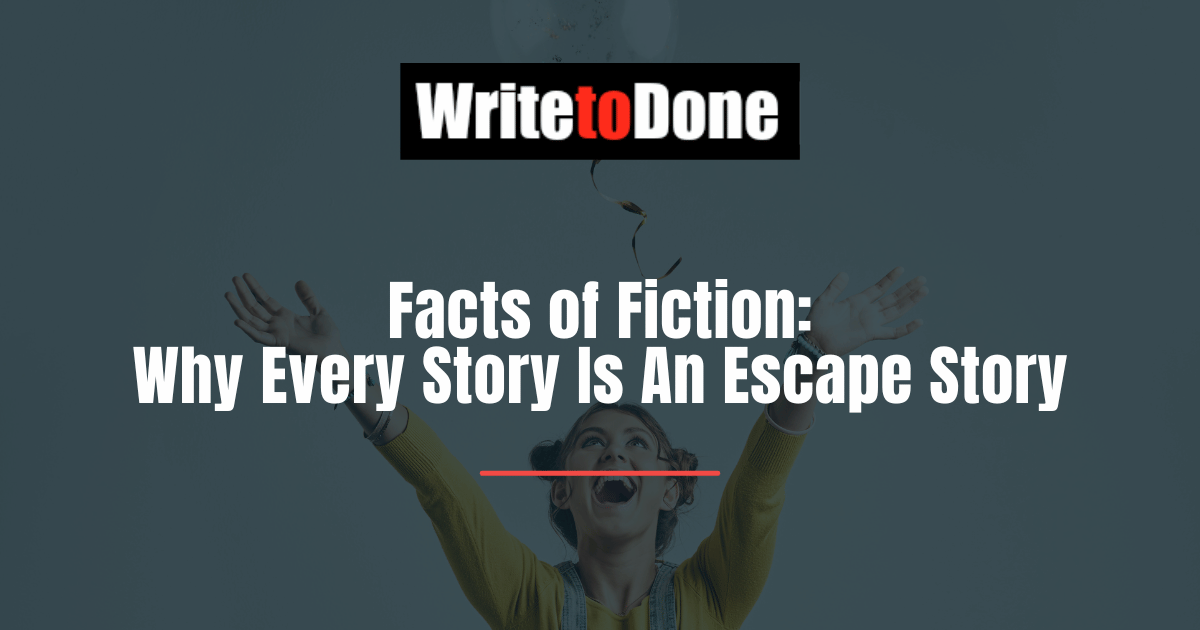“Every story is an escape story.”
I hold this bold idea in mind as I write a story.
I’ve printed it up and taped it to the wall beside my computer.
It serves as a story overview that acknowledges a fact of our human condition:
We are all escaping something.
This radical notion hijacked my brain after a decade of professionally assessing and writing film scripts.
I found myself getting emotionally invested in characters that were somehow imprisoned.
I discovered that this is true of every good story.
All the best protagonists are trapped in the gravity field of an idea, a person, or a situation that makes their life not worth living.
Naturally, they’re going to escape.
Whatever else a story is about—revenge, love, courage, honour—at its heart, we find a protagonist escaping something.
Three great escapes
In The Great Escape, Steve McQueen is a prisoner of Stalag Luft III, so of course he escapes.
In A Room with a View, Lucy Honeychurch, on holiday in Italy with her chaperone, tries to escape the company of the man she is unsuitably attracted to.
In Casablanca, Humphrey Bogart is a prisoner of his “broken-hearted” point of view. If he doesn’t escape from under the weight of his self-pity, audiences will demand their money back. As they should!
In each of the above examples, it’s a different kind of prison from which the protagonist must escape.
One is a concrete jail, the other is a relationship, while the third is a belief system.
These three kinds of escape dominate most plots.
Let’s look at them more closely.
#1. Escaping a prison or place
Obviously, prison stories concern characters whose goal is an actual over-the-wall escape. O Brother Where Art Thou, for example. And Papillon. And the futuristic Escape from New York. And the current The Maze Runner.
If the protagonists don’t reach freedom, they will die physically, mentally, or spiritually.
In The Wizard of Oz, Dorothy yearns to escape Kansas for a place “where troubles melt like lemon drops.” Once she lands in Oz, the story is all about finding a way back home.
Escape or die trying!—it’s box office gold.
Even in Casablanca, which is essentially a love story, almost every character is preoccupied with escape. Casablanca is a staging ground for desperados waiting anxiously to flee the Nazis by flying to Lisbon and onward to freedom in America.
Who isn’t trying to escape to greater freedom?
It’s a condition of our human condition.
#2. Escaping a relationship
This is a more subtle and more common escape theme in fiction.
Love affair, job, family—these are relationships it’s not always possible to simply walk away from.
The generic dig-your-way-out prison break is a piece of cake compared to the difficulty of escaping some relationships.
Fatal Attraction comes to mind. The film depicts a relationship more horrifying than any real prison. Michael Douglas, a happily married man, risks a one-night stand. Big mistake. His partner in infidelity assumes a relationship from which our protagonist struggles to extricate himself. He’s lucky to escape with his life.
In the Booker Prize-winning novel, Hotel du Lac, a bride on the way to her wedding instructs the taxi driver to “Keep going! Don’t stop. Pass the church! Whatever you do, keep driving!” She escapes the wrong man and goes into hiding. Close call.
In Casablanca, Bogey escaped to the ends of the earth in hopes of never crossing paths with the woman who broke his heart.
Who hasn’t felt the need to escape a relationship?
#3. Escaping oneself
This is the most subtle, most common, and most significant escape theme.
From On the Waterfront, to Moonstruck, to Good Will Hunting, to Up in the Air, to Out of Africa, to Silver Linings Playbook, the protagonist is on a trajectory toward escaping themselves.
I mean escaping their self-destructive attitudes, and (very often) narcissistic beliefs.
The hero’s redemption and ultimate victory hinges on their rising above self-concern.
And this rarely happens unless the writer brings the hero to the point of utter despair.
Here’s another fact of life:
“Desperation is the raw material of drastic change. Only those who can leave behind everything they have ever believed in can hope to escape.” ~ William S. Burroughs
Desperation followed by escape—that’s what kickstarts radical personal change.
Why do we need to escape ourselves?
Because we are all liars.
“We tell ourselves stories that can’t possibly be true, but believing those stories allows us to function. We know we’re not telling ourselves the whole truth but it works, so we embrace it.” ~ Seth Godin, author
It turns out that our delusional stories protect us from inconvenient truths.
We are all liars by necessity.
But the truth has a delicious way of coming out.
The truth always escapes—drama depends on it
However many enemies we invent to challenge our heroes, we writers must keep in mind that the ultimate victory is always the escape from the small and misguided self.
Nearly every good story I’ve studied features a protagonist who only earns the right to enter Act III after they’ve escaped the belief system that’s holding them back from true happiness.
Take Moonstruck, for example:
Loretta (Cher) is marrying Johnny who she is not in love with. Her heart is safer that way.
Then she meets her fiancé’s younger and more feral brother, Ronny (Nicholas Cage).
The story is all about a woman holding herself back from true happiness in order to avoid any chance of a broken heart.
Listen to Ronny trying his damnedest to help Loretta escape her self-destructive belief system:
“Loretta… love don’t make things nice. It ruins everything, it breaks your heart. We’re not here to make things perfect. Snowflakes are perfect. The stars are perfect. Not us. We are here to ruin ourselves and break our hearts and love the wrong people, and die!”
This is the scriptwriter (John Patrick Shanley) bringing us to the moment of the protagonist’s escape.
Will Loretta abandon her belief system and risk real love? Or will she become a tragic character?
It’s human nature to play it safe, but we want our heroes to live dangerously. We want them to transcend themselves.
Heroes escape themselves — it’s a fact of fiction because it’s a fact of life.
Consider Casablanca once again:
There’s a good reason why this 1942 Oscar-winning film is rated one of the best flicks of all time. The protagonist is engaged in all three escapes at the same time.
- Escape from the Nazis
- Escape from ex-lover
- Escape from self-pity
But it’s escape #3—Bogey’s escape from the prison of his self-interest—that gives viewers their money’s worth.
Every story is an escape story.
A writer’s duty
This is more than a story overview.
It’s a writer’s duty to her fictional heroes.
By orchestrating their escape, a writer proves how truly, madly and deeply she loves her protagonist.
We might think we’re proving our love for our heroes by handing them victory at the climax.
But if we don’t also force them to suffer the pain of shedding their outmoded sense of self, we have failed to love them to the max.
If we love our protagonist, we will help them escape from their small self. It’s hard to write a satisfying story without including this personal victory. It’s almost as if fiction exists to remind us that we are born to escape.
And we are!
If the foregoing is true, then “born to escape” is one of the juiciest facts of life.
And therefore one of the most powerful facts of fiction.
Escape stories hook us because they speak to a deep human yearning.
Check it out for yourself—study films and novels—and see if it’s not true that every story is an escape story.
What kind of escape are you or your fictional characters engaged in? Share your thoughts in the comments below!

















